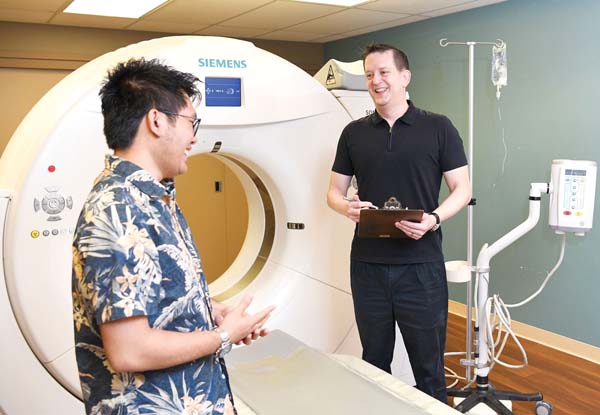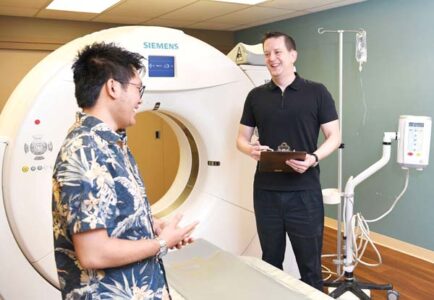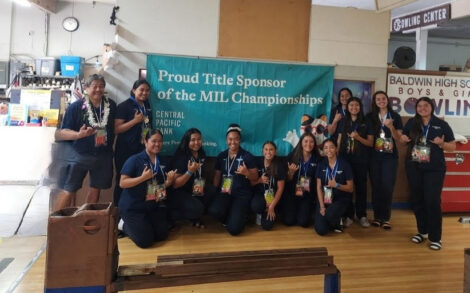Maui physicians back bill to lessen their tax burden
Bill would exempt medical providers from GET for treating some patients

Maui Diagnostic Imaging Medical Director Dr. Andrew Kayes, M.D., (right) talks with X-ray technologist Lyster Estoconing in front of a multislice CT scanner Friday morning in Kahului. Kayes, a radiologist, says it is unfair and inequitable to tax people for health care and is one of the physicians supporting a bill that would exempt medical providers from the state general excise tax for treating patients with Medicare, Medicaid and TRICARE. — The Maui News / MATTHEW THAYER photo
Doctors on Maui and across the state are backing a bill in the state Legislature that would exempt them from the general excise tax for treating patients who are elderly and poor, along with active duty and retired military.
The physicians say the move could help keep their businesses afloat, attract new doctors and keep local physicians at home, which have long been challenges for Hawaii’s health care system.
Senate Bill 1035 aims to exempt medical care providers from the state GET for treating patients with Medicare, Medicaid and TRICARE.
The bill has passed through the Senate and has been referred to three House committees — Finance, Health and Homelessness, and Economic Development.
“Nationwide, most medical practices lose money caring for Medicaid patients and typically break even caring for Medicare patients,” said Dr. Scott Grosskreutz, of the Hawaii Provider Shortage Crisis Task Force, who is also a radiologist on Hawaii island. “The GET taxation of gross revenues, when providers are breaking even or losing revenue, causes many practices in our state to be fiscally insolvent, jeopardizing their ability to keep their doors open.”
Longtime Maui Dr. Colleen Inouye, who is also the interim executive director for the Hawaii Independent Physicians Association, said that physicians, except those employed by hospitals and nonprofits, pay GET on all medical services. While the bill would only remove the GET on the Medicare, Medicaid and TRICARE medical services, it could help overall.
“Maui is a tourist destination; however, tourists always question the GET payment because most do not pay it in their home states,” she said, noting that only Hawaii has the GET on medical services and New Mexico has a general receipts tax.
Maui Dr. Stacy Ammerman, testifying for Maui Lani Physicians and Surgeons, said in written testimony to the Legislature that the burden is mostly placed on private practice physicians.
“We are the medical group that struggles the most and are barely surviving as it is,” she wrote. “I see more and more private practice practices closing or physicians leaving the state because they can’t afford to keep practicing here.”
Dr. Andrew Kayes, medical director of Maui Diagnostic Imaging, has been a private practice radiologist for 16 years on Maui. His wife is a math teacher and his three children were born here.
Maui is now his home and he has no plans to leave.
But, he says, “it has gotten more and more difficult to practice medicine year after year. Many private practice physicians and providers that I know are operating on smaller and smaller margins due to cuts in reimbursements and increases in expenses.”
“And although my primary goal is excellent patient care, my partners and I can’t run a practice on (just) good intentions,” he said.
Kayes said it is illegal for private practice doctors like him to pass along the excise tax to his patients.
“Meaning that on top of already low reimbursement rates for Medicare, Medicaid and TRICARE, in an expensive geographic area, to treat Medicare, Medicaid and TRICARE patients, doctors have to eat an additional 4 percent of the cost” due to the general excise tax, he explained.
Kayes said that Maui is “more than 30 percent under-doctored” and “it is not rocket science — how can we possibly attract new doctors if it costs more to live here than on the Mainland, and reimbursements are lower than the Mainland?”
According to a University of Hawaii report on the local physician workforce released in December, Hawaii as a state has a shortage of 776 physicians, or 22 percent of the full workforce it needs. Maui County had a shortage of 167 physicians, or 40 percent, according to the report.
While removing the GET for some medical services could help ease the costs for physicians, it would also decrease revenues for the state each year.
Gary Suganuma, state director of taxation, said in written comments to the Legislature that the department could implement the measure no earlier than Jan. 1, 2024.
He provided comments to the Senate’s committees on Commerce and Consumer Protection along with Ways and Means, which included a breakdown of revenue loss to the general fund if the measure passes, including $22.2 million in fiscal year 2024, $52.7 million in fiscal 2025, $54.4 million in fiscal 2026, $56.6 million in fiscal 2027, $59.2 million in fiscal 2028 and $65.6 million in fiscal 2029.
He did not advocate for or against the bill.
* Staff Writer Melissa Tanji can be reached at mtanji@mauinews.com.
- Maui Diagnostic Imaging Medical Director Dr. Andrew Kayes, M.D., (right) talks with X-ray technologist Lyster Estoconing in front of a multislice CT scanner Friday morning in Kahului. Kayes, a radiologist, says it is unfair and inequitable to tax people for health care and is one of the physicians supporting a bill that would exempt medical providers from the state general excise tax for treating patients with Medicare, Medicaid and TRICARE. — The Maui News / MATTHEW THAYER photo




